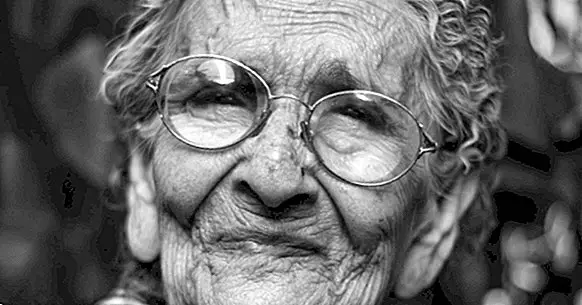Sexuality in Aging: older people also have sex
Recently they have talked about Sexuality in the elderly in his latest research Feliciano Villar, Carme Triadó, Montse Celdrán and Josep Fabà; Psychogerontologists with great training and experience. They refer to the perspective of the institutionalized older person, but also to the perspective of the professional.
Of course, on the one hand, many medications that treat neurodegenerative diseases in the third and fourth age provoke as a secondary effect behaviors related to hyper-sexuality and / or sexual behavior disorders that are so complicated to treat or redirect for a professional of the geriatric care. In fact, the uninhibited behavior of the elderly person in relation to the Auxiliary is usually habitual.
That is why This article deals with sexuality in aging , as well as the most important conclusions that these authors have agreed upon after their investigation; because it is very important to know well the Sexuality in the Aging to treat the elderly from the Person Centered Care and offer the highest quality of life possible.
- Related article: "The 3 phases of old age, and its physical and psychological changes"
Sexuality in aging
It is a reality that almost all people, from birth to death have sexuality, as well as the need to have sexual relations with others and alone. Therefore, it is a reality also that nowadays in residential centers there is a very relevant lack of privacy as well as individualized follow-up to the elderly due to lack of resources, professionals and, above all, training and communication.
In fact as well say Villar, F., Triadó, C., Celdrán, M., Fabà, J. (2017), after having interviewed elderly residents and professionals, some of them comment that there are professionals who tend to have reactions negative and very pejorative towards older people expressing their affective needs both in public and in private; In general, we do not react naturally, neither older people nor professionals, precisely because there is a clear stigmatization in the third and fourth age, in addition to age (ageism).
- Related article: "5 basic principles to enjoy a full and satisfactory sexuality"
What are the sexual needs in aging?
According to the elderly people participating in the research and according to the professionals, in this case 83 of a total of 100, explain that sexual needs are maintained during the aging process, although not totally . However, some particularly consider that "interest is maintained but practice declines", and the intensity of sexual needs diminishes but they do not disappear.
In any case, the sexual needs in the Aging, as in the Adult Stage, will depend above all on the Life History, as well as the vulnerability to certain neurodegenerative and / or neuropsychiatric diseases, since the sexual desire is closely related to said diseases that are also so frequent. This set, therefore, must be reviewed by a socio-health professional, in this case the Psychogerontologist either in Residential Centers or in Home Care Startups; with the purpose of preserving in the best possible way the intimacy of the person and facilitating sexual expression since there are, according to the authors, two barriers in which work is required:
Internal Barriers
Pudores and feelings of shame in the case of sexuality in old age, they are the greatest age groups that exist, the greatest estimate, the greatest internal barrier. We speak of moral rules and generational factors such as repressive education.
External Barriers
The context in the Residential Centers as the context in the Home as well as the infrastructure of the space in which the elderly person is located is the main external barrier. In Residential Centers, due to lack of resources, they tend to live in shared spaces with a clear lack of privacy and in the domicile, infantilization and overprotection are frequent. In this case, in the Centers the individual rooms would be a Facilitator and in the Home it would be an adequate clinical evaluation of the elderly as well as their context.
- Maybe you're interested: "The 8 most frequent sexual problems and how to treat them"
Barriers and facilitators for the expression of libido
What can professionals do about this? According to Villar, F., et al."When asked about the most frequent sexual behaviors among residents, the majority of respondents (many residents do not, as they believe that this dimension is absent in institutions), masturbation is the most mentioned. Practically all professionals mention this type of behavior, which in many cases have been involuntary witnesses. So, what are the objectives and strategies to follow?
1. In relation to the elderly
Know firsthand your Life Story as well as evaluate and treat your neurodegenerative diseases and study the possible side effects of their psychopharmacological treatment.
2. In relation to the context
Due to the lack of resources, it is difficult to have individual rooms in the Residential Centers, which is why the best option is to watch for delaying and / or avoiding entry into these centers through the help of new home care startups.
3. In relation to the entire staff of professionals
To favor the continuous communication between Auxiliaries of Nursing and Psychogerontologists with such offer a person-centered care in the best way possible . To advise, in addition, is one of the main characteristic functions of the sociosanitary professionals of the third and fourth age.
Sexuality and Dementia: 3 points to consider
When dementias and sexuality overlap, the following points should be taken into account.
1. Discerning consent
Nursing Assistants with more than one patient in charge usually find themselves in situations in which they do not know how to handle the situation. It is clear that a sexual relationship between two people who have dementia or a couple in which one of the two suffers from a neurodegenerative disease creates a lot of uncertainty, so it is difficult to know how to discern the consent of the elderly person. That is why Prevention and Follow-up is important or carried out between Psychogerontologists and Auxiliaries in a horizontal way, through the ACP, to find a solution.
2. Advise and collect information
Occasionally, the reactions of professionals such as Nursing Assistants, Social Workers, Nurses, Psychogerontologists, etc., and / or family members are not correct, so Childhood can happen . That is why it is essential to stay informed and provide communication between professionals in order to advise and gather information from the different parties involved.
3. Dramatize
Dramatize and avoid the uninhibited behavior of the elderly person , if this is the case, they are the key in which professionals work to promote the well-being of the elderly; always, but from the focus of the ACP and from the evaluation and treatment within a clinical context.
Uninhibited behavior of the elderly person in relation to the Nursing Assistant
Psychotropic drugs such as antidepressants and benzodiazepines, which are usually prescribed at the aging stage to treat generally neurodegenerative diseases or dysthymic symptoms or symptoms of anxiety can alter sexual libido, sexual desire or trigger sexual behavior disorders if there is not adequate follow-up in the elderly person.
Uninhibited behavior refers to socially impertinent behaviors such as exhibitionism, indecent language and sexual intentions to the other without consent - decided unilaterally -. It may be due to neuropsychiatric symptomatology and / or coexisting with neurodegenerative symptoms.
In general, such behaviors usually happen in the face of the Nursing Assistant who is the professional who is physically and on a day-to-day basis with the elderly person residing in a center or in the SAD, the home-based service. In both cases, it is important to know the beneficiary of the service well in order to offer the best possible welfare.
- Related article: "Exhibitionism: causes and symptoms of this sexual paraphilia"
Conclusion: Psychogerontologists and Auxiliaries working together
In short, the solution to the stigmatization of sexuality in older people and the lack of privacy lies above all in the work of professionals, be they auxiliary, psychogerontologists / as, nurses and assistants who are in direct contact with the elderly This is why it is important to prevent (knowing the neurodegenerative diseases), know how to discern consent, advise and collect information and, above all, to de-dramatize situations in which affective behaviors occur , as well as finding solutions to inappropriate behaviors, always from the Person Centered Care approach and from the evaluation within the clinical context.
Bibliographical references:
- Villar, F., Triadó, C., Celdrán, M., Fabà, J. (2017) Sexuality and Elderly Institutionalized: the perspective of the resident and the perspective of the professional. Madrid: Pilares Foundation.



















